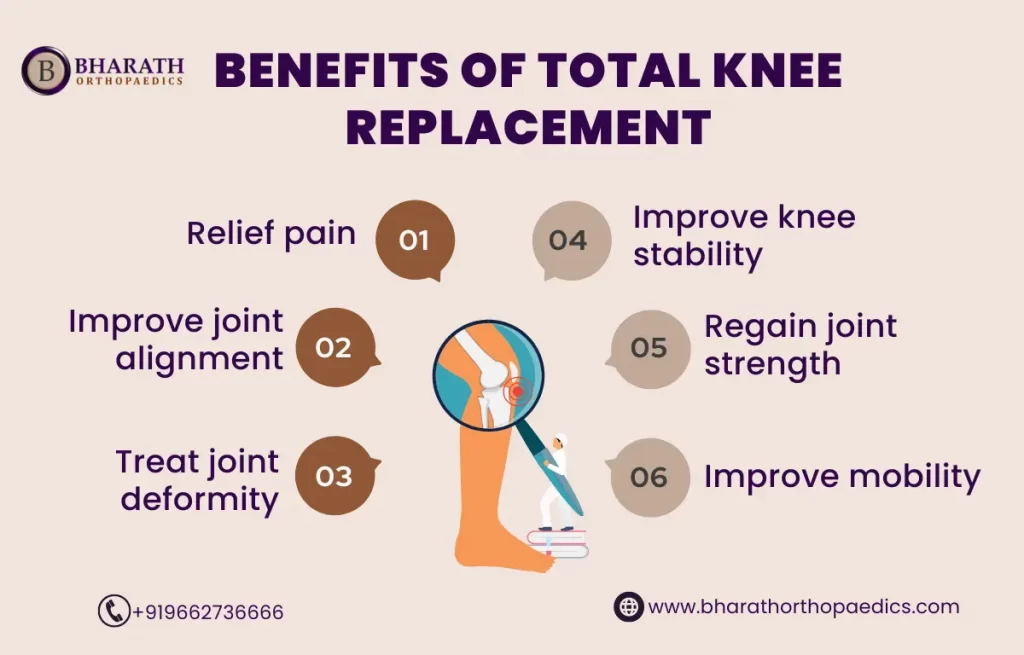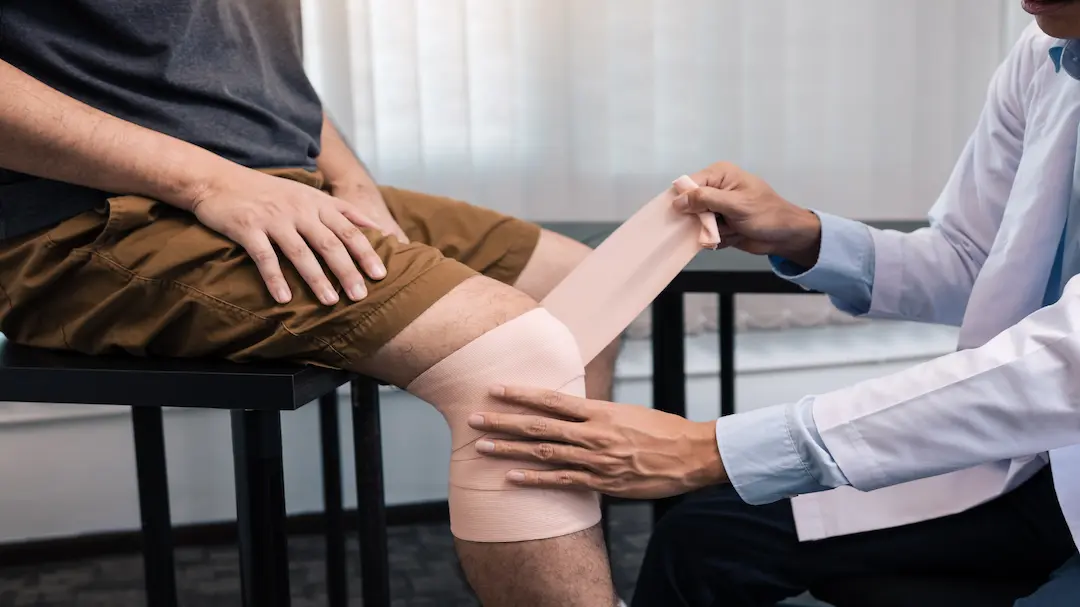Total Knee Replacement in Chennai is one of the most effective treatments for individuals suffering from severe knee pain due to conditions like osteoarthritis or injuries. Knee replacement surgery in Chennai offers patients relief from chronic pain and improves mobility. However, many are concerned about the knee replacement surgery cost in Chennai and whether it is the right option for them. In this guide, we’ll explore everything you need to know about Total Knee Replacement in Chennai, from the procedure to recovery.
What is Total Knee Replacement Surgery?
Total Knee Replacement in Chennai is a surgical procedure where damaged parts of the knee joint are replaced with artificial components. This surgery is usually recommended when the knee is severely damaged due to arthritis or injury and when other treatments like medication or physical therapy have not provided relief. The goal of the surgery is to reduce pain and improve function, allowing the patient to resume daily activities with ease.
When is Total Knee Replacement Recommended?
Total Knee Replacement in Chennai is often advised for individuals experiencing severe knee pain and mobility issues due to conditions such as:
- Osteoarthritis: Degeneration of joint cartilage leading to pain and stiffness.
- Rheumatoid Arthritis: An autoimmune disorder causing joint inflammation.
- Post-Traumatic Arthritis: Arthritis resulting from knee injury.
Key Indicators for Surgery:
- Persistent knee pain unresponsive to conservative treatments.
- Significant reduction in knee function and mobility.
- Difficulty performing daily activities like walking or climbing stairs.
Early consultation with an orthopedic specialist in Chennai can determine if Total Knee Replacement is the appropriate course of action.
Our Expert Total Knee Replacement Surgeon
Dr. L. Bharath is recognized as a leading expert in Total Knee Replacement in Chennai, known for his skillful approach and dedication to patient care. With years of experience, he has performed numerous successful knee replacements, focusing on personalized treatment plans and fast-track recovery protocols. Dr. Bharath’s expertise in Knee Replacement Surgery in Chennai includes using the latest technologies and minimally invasive techniques, ensuring minimal discomfort and quicker rehabilitation. His reputation for delivering the Best Knee Replacement Surgery in Chennai makes him a trusted choice for patients seeking comprehensive knee care solutions.

Types of Knee Replacement
Knee Replacement Surgery in Chennai comes in several types, depending on the extent of the damage and the patient’s individual needs. The most common types include:
- Total Knee Replacement: This involves replacing the entire knee joint.
- Partial Knee Replacement: Only the damaged part of the knee is replaced.
- Minimally Invasive Knee Replacement: This technique uses smaller incisions and reduces recovery time.
Total Knee Replacement in Chennai is the preferred choice for individuals with extensive knee damage.

Total Knee Replacement Procedure
The Total Knee Replacement procedure involves several key steps:
- Anesthesia: The patient is given either general or spinal anesthesia to ensure they are pain-free during the procedure.
- Incision: A cut is made to expose the knee joint.
- Reshaping: The damaged bone and cartilage are removed and replaced with metal and plastic components.
- Closing: The incision is closed, and the patient is taken to recovery.
This process ensures the knee joint is properly aligned and functional.
Revision Surgery of the Knee Replacement
Revision knee surgery is performed when a previous knee replacement fails due to wear, infection, loosening, or mechanical issues. During Total Knee Replacement in Chennai, skilled surgeons assess the damaged prosthetic and replace it with new components to restore knee function.
- Evaluation: The surgeon conducts imaging tests to assess the failed knee implant and surrounding bone structure.
- Removal of Old Implant: Damaged components are carefully removed without harming the healthy bone.
- Bone Preparation: The knee joint is thoroughly cleaned, and areas of bone loss are repaired using bone grafts or specialized metal components to provide a stable foundation for the new implant.
- New Implant Placement: A new prosthetic, often custom-fitted, is implanted and tested for proper function and alignment.
- Closure: The wound is closed using sutures, and sterile dressings are applied to protect the surgical site.
What Happens During a Total Knee Replacement?
During Total Knee Replacement in Chennai, the surgeon carefully removes the damaged knee components. Here’s what typically happens:
- Preparation: The patient is positioned on the operating table, and anesthesia is administered.
- Resection: The surgeon removes the damaged bone and cartilage, reshaping the remaining bone to fit the prosthetic.
- Implantation: The artificial components are inserted and tested for proper alignment and movement.
- Closure: The surgical site is cleaned, and stitches are used to close the incision.
This surgery is typically performed in a hospital and may take a few hours.
What Happens After Total Knee Replacement?
After Total Knee Replacement in Chennai, patients undergo a period of recovery, which includes:
- Immediate Post-Operative Care: The patient is monitored as they wake up from anesthesia.
- Physical Therapy: Early physical therapy is critical to help regain knee mobility.
- Pain Management: Pain medication is administered to manage discomfort.
- Follow-Up Visits: Regular check-ups are needed to ensure proper healing.
The recovery phase usually involves rest, physiotherapy, and gradual activity.
Is Total Knee Replacement Safe in Chennai?
Yes, Total Knee Replacement in Chennai is generally considered safe, with high success rates. The city’s medical infrastructure and skilled orthopedic surgeons contribute to positive patient outcomes.
Safety Considerations:
- Pre-Surgical Evaluation: Comprehensive assessments to ensure patient readiness.
- Sterile Surgical Environment: Adherence to strict hygiene protocols to prevent infections.
- Post-Operative Care: Structured rehabilitation programs to promote recovery.
Patients are encouraged to discuss potential risks and benefits with their healthcare provider to make informed decisions.
Who Needs Knee Replacement Surgery?
Knee replacement is recommended for individuals with severe joint damage who have not found relief from medications or physical therapy. Patients often experience chronic pain, stiffness, and limited mobility.
- Osteoarthritis Patients: Individuals suffering from advanced osteoarthritis where cartilage loss causes bone-on-bone friction and constant pain.
- Rheumatoid Arthritis: People with inflammatory joint damage that leads to swelling, deformity, and reduced joint function.
- Post-Traumatic Arthritis: Patients who develop arthritis after a previous knee injury, fracture, or ligament damage.
- Failed Previous Surgeries: People needing revision due to worn implants or complications, often treated by the Top 10 knee replacement surgeon in Chennai.
- Reduced Quality of Life: When knee pain limits daily activities like walking, climbing stairs, or even sleeping, knee replacement becomes necessary
The Best knee replacement Hospital in Chennai offers personalized treatment plans, ensuring that only those who truly need surgery undergo the procedure.
Risks of Total Knee Replacement
While Total Knee Replacement in Chennai is generally safe, there are some risks involved, such as:
- Infection: Infection at the surgical site can occur.
- Blood Clots: Post-surgery blood clots may form in the legs.
- Prosthesis Failure: The artificial joint may wear out over time.
- Nerve Damage: Nerve injury is a rare but potential complication.
It’s important to follow the surgeon’s advice to minimize these risks.
Benefits of Total Knee Replacement
Total Knee Replacement in Chennai provides numerous benefits, including:
- Pain Relief: One of the primary benefits is significant knee pain relief.
- Improved Mobility: After recovery, most patients experience improved mobility and can perform daily activities more easily.
- Long-Term Relief: With proper care, the results of the surgery can last for many years.
This surgery greatly improves the quality of life for individuals with severe knee pain.
How Much Does a Knee Replacement Cost in Chennai?
The Total Knee Replacement Cost in Chennai varies based on several factors, including hospital facilities, surgeon expertise, and implant quality. According to Practo, the cost ranges from ₹1,00,000 to ₹4,00,000.
Factors Influencing Cost:
- Hospital Choice: Premium hospitals may charge higher fees.
- Surgeon’s Experience: Highly experienced surgeons might have higher consultation and surgery fees.
- Type of Implant: Advanced implants can increase the overall cost.
Affordable Knee Replacement Surgery in Chennai is achievable by comparing different hospitals and understanding the inclusions in the quoted price.
Causes of Knee Damage
Total Knee Replacement in Chennai is often recommended when knee damage is caused by:
- Osteoarthritis: The most common cause of knee pain and damage.
- Rheumatoid Arthritis: An autoimmune disease that causes inflammation in the knee joint.
- Injury: Damage from accidents or sports injuries can lead to the need for knee replacement.
For individuals suffering from these conditions, Affordable Knee Replacement Surgery in Chennai offers an effective solution to restore mobility and improve quality of life.
Symptoms of Total Knee Replacement
Before considering Total Knee Replacement in Chennai, it’s important to recognize the symptoms of severe knee damage:
- Chronic Pain: Persistent knee pain, especially when walking or climbing stairs.
- Stiffness: Difficulty bending or straightening the knee.
- Swelling: The knee may become swollen and tender.
- Weakness: The knee may feel unstable, and it may be difficult to bear weight.
These symptoms often indicate the need for knee replacement surgery.
Preparing for Knee Replacement Surgery
Proper preparation is essential to improve surgical outcomes and reduce recovery time. Hospitals specializing in Knee replacement surgery cost in Chennai provide patients with a clear plan before surgery.
- Medical Evaluation: A full assessment of the patient’s overall health, including blood tests, ECG, and imaging scans of the knee.
- Pre-Surgery Exercises: Patients are guided through light exercises to strengthen surrounding muscles, enhancing post-surgery recovery.
- Home Preparation: Arrangements like safety rails and raised chairs help patients manage better after discharge.
- Medication Adjustments: Doctors review and adjust medications like blood thinners to prevent complications during surgery.
- Financial Planning: The Knee replacement surgery cost in Chennai is explained in detail, helping patients plan for implants, hospital stays, and rehabilitation.
- Surgeon Consultation: The Top 10 knee replacement surgeon in Chennai explains the procedure, answers questions, and sets realistic recovery expectations
Proper preparation ensures a smoother surgery and faster return to normal activities
Recovery from Total Knee Replacement
The recovery process for Total Knee Replacement in Chennai typically involves:
- Initial Rest: After surgery, rest is essential for healing.
- Physical Therapy: This is crucial for regaining strength and mobility.
- Pain Management: Pain medications and anti-inflammatory drugs help with recovery.
- Gradual Return to Activity: Patients are encouraged to gradually increase their activity levels.
Full recovery can take several months, but most patients begin walking with assistance within weeks.
Conclusion
Total Knee Replacement in Chennai can be life-changing, offering relief from chronic knee pain and restoring mobility. The best knee replacement surgery in Chennai ensures that the procedure is performed by experienced surgeons using the latest techniques. While the knee replacement surgery cost in Chennai may vary, the benefits far outweigh the expenses. If you’re considering Total Knee Replacement in Chennai, consult a qualified orthopedic surgeon to discuss your options.
Read also Exercises for a Hamstring Strain.


